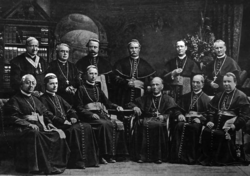This article needs additional citations for verification. (February 2021) |

Clergy are formal leaders within established religions. Their roles and functions vary in different religious traditions, but usually involve presiding over specific rituals and teaching their religion's doctrines and practices. Some of the terms used for individual clergy are clergyman, clergywoman, clergyperson, churchman, cleric, ecclesiastic, and vicegerent while clerk in holy orders has a long history but is rarely used.[citation needed]
In Christianity, the specific names and roles of the clergy vary by denomination and there is a wide range of formal and informal clergy positions, including deacons, elders, priests, bishops, preachers, pastors, presbyters, ministers, and the pope.
In Islam, a religious leader is often known formally or informally as an imam, caliph, qadi, mufti, mullah, muezzin, and ulema.
In the Jewish tradition, a religious leader is often a rabbi (teacher) or hazzan (cantor).